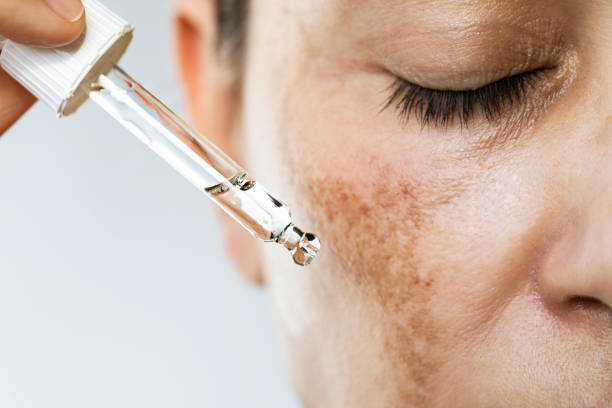
Hyperpigmentation is a common skin concern that affects people of all ages and skin types. It can manifest as dark spots, uneven skin tone, or melasma, and is often the result of various factors, including sun exposure, hormones, and inflammation. Fortunately, there are several effective treatments available to help combat hyperpigmentation and achieve a more even complexion. In this blog post, we’ll explore some of the top treatment options for hyperpigmentation, including IPL (Intense Pulsed Light), retinol, chemical peels, vitamin C, SPF (Sunscreen), and micro needling.
IPL (Intense Pulsed Light)
IPL, or Intense Pulsed Light therapy, is a popular choice for treating hyperpigmentation. It uses pulses of broad-spectrum light to target and break down melanin deposits in the skin. IPL is particularly effective for sun-induced pigmentation, such as sunspots and freckles. During the procedure, the light energy is absorbed by the pigment, which then heats and shatters the melanin particles. Over time, the body’s natural processes remove the fragmented pigment, leaving behind a more even complexion.
Retinol
Retinol, a derivative of vitamin A, is a powerhouse ingredient in the fight against hyperpigmentation. It works by increasing cell turnover and promoting the shedding of darkened skin cells. Additionally, retinol can stimulate collagen production, improving overall skin texture and reducing the appearance of fine lines and wrinkles. Incorporating a retinol-based product into your skincare routine can help fade hyperpigmentation gradually while enhancing the skin’s radiance.
Chemical Peels
Chemical peels are a dermatologist-recommended treatment for hyperpigmentation. These procedures involve applying a chemical solution to the skin’s surface, causing controlled exfoliation of the top layers. As the old skin peels away, new, healthier skin emerges. Chemical peels can help lighten dark spots, reduce the appearance of scars, and improve skin texture. Depending on the depth and strength of the peel, multiple sessions may be required for optimal results.
Vitamin C
Vitamin C is a potent antioxidant that can help brighten the skin and fade hyperpigmentation. It inhibits the production of melanin and protects the skin from free radical damage caused by UV radiation. Incorporating a vitamin C serum into your skincare routine can not only lighten existing dark spots but also provide protection against future damage. It’s important to use vitamin C products consistently for the best results. Equally important is to know that not all vitamin C products are created equally. The purity, concentration, delivery method in to the skin and stability of the ingredient are all very important factors in the effectiveness of this in a skin care regime. It is also important to know how much testing and research the product you choose has undergone for efficacy and safety (this could be a whole blog post in it’s self!).
SPF (Sunscreen)
Sunscreen is a non-negotiable step in any hyperpigmentation treatment plan. UV radiation from the sun can exacerbate existing hyperpigmentation and trigger the formation of new dark spots. Apply a broad-spectrum SPF 30 or higher daily, even on cloudy days, and reapply as needed. Sunscreen not only prevents further damage but also allows other treatments to work more effectively.
Micro needling
Microneedling is a minimally invasive procedure that involves using a device with tiny needles to create controlled micro-injuries in the skin. This process stimulates collagen production and can help improve the appearance of hyperpigmentation. Microneedling may be combined with topical treatments, such as vitamin C or hyaluronic acid, to enhance results. It’s essential to consult with a professional for microneedling to ensure safety and effectiveness.
In conclusion, hyperpigmentation is a common skin concern, but it doesn’t have to be a permanent one. With the right combination of treatments, you can achieve a more even and radiant complexion. Whether you opt for IPL, retinol, chemical peels, vitamin C, SPF, or microneedling, consistency is key. Consult with our skin experts to create a personalized treatment plan tailored to your specific needs and skin type. Remember that results may vary from person to person, so patience and diligent skincare are essential on your journey to clearer skin.